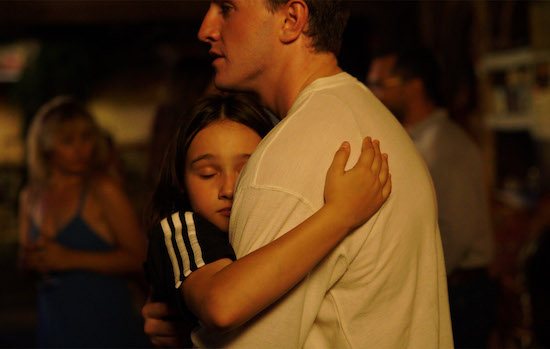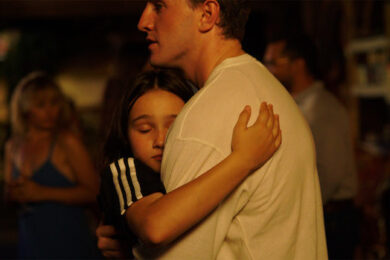In the cathartic, climatic scene of Aftersun, the film’s past and present storylines dramatically intertwine. Calum tumbles into a rave, losing himself under the strobe lights on the dancefloor, and his daughter Sophie, both as she was then and is now, tries to grab him, hold him, to understand the past. Or maybe just get one last hug and say everything she didn’t get the chance to.
As the screen pulses between the bright lights and pitch black, Sophie futilely shouts to try and make her dad hear her. ‘Under Pressure’ plays until it starts to fall apart. The tone slowly shifts and morphs, and a low, frantic cello takes over. Freddie Mercury’s vocals are isolated as he forlornly screams ,“Why can’t we give love one more chance?” over and over again.
This is the crescendo of Aftersun, where soundtrack and score meet each other, and it’s the perfect alchemy of music and image: the song helping to tell us about the nature of Sophie’s relationship to Calum. It’s all there: the anguish and the love and the pain and the heartbreak, and all the things that remain unresolved. “This is our last dance / this is ourselves,” the lyrics are so direct, so on the nose that they become incredibly potent; a song whose impact might have been blunted by its ubiquity (and one I’ve never liked), takes on a whole new meaning.
“I do not know what possessed me to do it,” explained Charlotte Wells, the film’s director, in an interview. “But I pulled ‘Under Pressure’ into the edit, I dropped it on the timeline. It was almost a joke, just to see how it would feel. And it just kind of struck magic. And then the challenge of the next nine months of editing was earning it, and earning the confidence to allow lyrics to be so obvious in the film.”
And boy, do they earn it. That is the magic of Well’s intimate, beautiful and haunting debut feature: the film an array of memories about a daughter trying to understand her relationship with her dad when all that’s left are dogeared polaroids and grainy home video recordings of their holiday in Turkey, as Sophie attempts to untangle her memories – real, imaginary and recorded. You can feel the deep ache all the way through it.
The music of the film is central to capturing that tone and vividly creating that world: perfectly selected needle-drops acting as both a sonic timestamp and also revealing the character’s internal monologue, the songs vividly evoking specific times and capturing Calum and Sophie’s emotions.
Much of the soundtrack beautifully captures the feel of an era, and throughout it feels like the songs mingle in the air, like they’re pouring out of a hotel window or played through tinny speakers by a sunlounger. Everyone from Queen and Blur to Los del Río, Aqua and Bran Van 3000 float over the scenes, a document of the time and place while also hinting at the mostly concealed feelings that haunt the characters.
Each song adds to a sort of photobook you leaf through, a time machine that drops you in a place you can nearly touch. Songs are used to evoke cultural trends (hello “La Macarena”) and as Calum is older he listens to his Deacon Blue, but most of the time it’s like listening to Shine Volume 9 with Chumbawamba’s ‘Tubthumping’ (maybe the most ‘90s song ever?) pumping out as drinks flow at the resort and indie-disco classics like Lightning Seeds’ ‘Lucky You’ and ‘Road Rage’ by Catatonia soundtrack Sophie at the arcades (though Wells did explain to Edith Bowman on her Soundtracking podcast that they dropped Oasis and Spice Girls tracks from a scene, because they drew too much attention to themselves).
But it’s always something more than mere nostalgia. Wells was wary that music could often be used as a shortcut to feelings – but here the needle drops are always central to the scene, weaved carefully into the narrative. With a film like this, which is so much about the gaps and pauses of life, about what we don’t say and where emotions are hidden under the surface, music is key to building the narrative.
It’s a quiet film, where the details gently accumulate and Oliver Coates’ brilliant score helps create that dreamy feeling of sound washing over you. It rises and creeps up on you, capturing the idea of the beauty and the heat and the tension simmering under the surface as his cello mixes with the noises of crashing waves or babies crying.
The eerie, wistful quietness makes the popular music all the more powerful; it makes you take in each word of the songs, looking for meaning. Take the use of ‘Tender’ – at first it seems incidental to the scene, but as we move from a chat in the hotel room about home and belonging to Calum in the club the tempo is pitched down, creating an anxious, panicked tone, Damon Albarn’s voice sounding almost unrecognisable, Coxon’s “Oh my baby” lines stretched out and distorted. It’s as if we’re hearing inside Calum’s head, listening to just how overwhelmed he is with a sadness he can’t show his daughter.
Like ‘Under Pressure’, it shows the way Wells and Coates use music to create a whole new dimension of meaning and emotion, merging the soundtrack with the score. ‘Tender’ was one of the few songs written in the script, Wells said, and it shows: the scene perfectly captures that dream-like and unsettling feel.
And I suppose that’s what struck me most: how beautifully the film reveals music’s power to meditate on life, death and all the mess that surrounds it. It shows how music is central to making sense of it all. In its own subtle way it shows how music puts a framework around our memories and makes us feel like we’re understood. It’s not only very funny that 11-year-old Sophie’s karaoke go-to is REM’s ‘Losing My Religion’ but her self-conscious performance really helps to express her inner feelings.
It’s a reminder of the unique role that pop music plays in our emotional lives. How songs are inescapably linked to memories and moments and how music helps us to find clarity and catharsis.
I can never tell whether it’s ludicrous or brilliant (probably both) that something as essentially ephemeral and flimsy as pop music has such a hold on the most important moments in our lives – even the fucking Macarena. Every single event in our life, locked in with a certain song or record, instantly putting us back in a place and time, and you really have no choice in the matter.
The Quietus’ very own Jude Rogers in her wonderful book The Sound of Being Human – which also deals with remembering her relationship with her father – talks about how music can kick start distant memories. One chapter recounts hearing a song that had been special to her and her dad and how hearing it many years later had a visceral effect, “arriving uninvited with the full force of a tornado… [It] whipped [me] into another dimension, and dropped me into a very different place.” But she also describes how music wraps you up, and comforts you and holds you in a way that not many things do. And those duel forces are at play throughout Aftersun.
Rogers goes on to explain how memory isn’t just an act of retrieval but a process of constant reconnection and reconstruction as time goes on. It’s the same for Sophie. Aftersun is, of course, about the deep bond between a father and daughter, but it’s also about how childhood memories – constantly replayed in your mind – are reconstructed and given new, different meaning as we get older.
The film shows music’s power to allow us to reach back to those memories – to help give them a shape and a meaning and help you through life’s most difficult times. It’s proof, if you needed it, that music has an indelible effect on the big moments in our lives, intertwines with our life to soundtrack them and help us make sense of them. It shows how music connects you with who we have been, and who you are now. “This is ourselves,” as Freddie Mercury sings over that warped cello.



